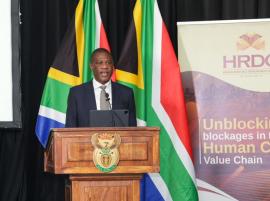
South Africa’s Human Resource Development Council (HRDC) has convened a critical meeting to address the country’s alarming unemployment rate, affecting a significant portion of the workforce, especially youth, women, and marginalised groups.
“We must acknowledge that the crisis of youth unemployment is particularly severe among young people not in employment, education, or training – the NEET cohort,” the Deputy President Paul Mashatile said on Thursday.
The country’s second-in-command was speaking as Chairperson of the HRDC at the
Gallagher Convention Centre in Johannesburg.He cited Statistics South Africa figures, which revealed that more than 3.5 million young people aged between 15 and 24 are disconnected from both the labour market and the education system.
Research from the South African Labour Development Research Unit at the University of Cape Town also highlighted the heterogeneous nature of the unemployed youth.
“Alarmingly, more than half of unemployed youth not in employment, education and training have been searching for work for over a year, underscoring the systemic barriers they face in securing a foothold in the labour market.”
Deputy President Mashatile referred to this as a persistent issue that requires the council’s innovation and leadership. “The future of the youth of South Africa is in our hands, and we must be radical in securing it.”
The HRDC is a multi-stakeholder advisory body that includes representatives from the government, business, labour and civil society. Its mandate is to advise the state on issues related to developing the skills and human potential of all South Africans.
The HRDC is identified as crucial in addressing this crisis by improving workforce skills, creating jobs, and fostering economic growth.
He believes that the statistics should encourage the council to reassess its role in engaging various stakeholders and social partners to develop skills that align with the needs of the South African economy.
“We must adopt a proactive stance and address the disparity between labour supply and demand,” Deputy President Mashatile said, highlighting the urgent need for innovative strategies.
He stressed the need for the HRDC to focus on the discipline of execution and ensuring policies are implemented effectively.
“We have at this stage mastered the art of policy making; however, some of these policies are not coming alive in the areas where they are needed to transform the lives of South Africans and the youth.”
He believes the school system faces difficulties in cultivating the skills required for a globalised, knowledge-driven economy, with a scarcity of skilled educators and a discord between existing skills and employer requirements.
However, he told delegates that the country is working to improve educational outcomes.
“The country is actively working to improve educational outcomes, particularly in foundational learning, and to attract and retain skilled professionals.”
In addition, initiatives like workplace integrated learning, career guidance, mentorship programme, entrepreneurship, and public employment programmes are crucial.
“Our nation requires us to have an integrated approach across a variety of sectors and levels, beginning with the development of young children and ending with their entry into the labour market.
“We need to do this with new energy and determination to build an HRDC that makes a difference in our communities.”
He called for the National Youth Development Agency (NYDA) to be at the forefront of integrating real-world experiences into education, fostering collaboration between educational institutions and employers, and equipping students with relevant skills.
With technological advancements rapidly transforming job markets, the council stressed the critical need for adaptable, digitally-inclusive skills development programmes that prepare youth for future economic challenges.
“The South African community must become digitally adaptive to ensure digital inclusivity for future generations.
“We must refocus our curriculum and skills development programmes to align with industry, economic, and social needs. As technology advances exponentially, today’s abilities may become obsolete tomorrow.”
The Deputy President highlighted the G20 Leaders’ Summit, emphasising the opportunity to create more inclusive and resilient education systems that prepare students for the future. – SAnews.gov.za
No comments:
Post a Comment